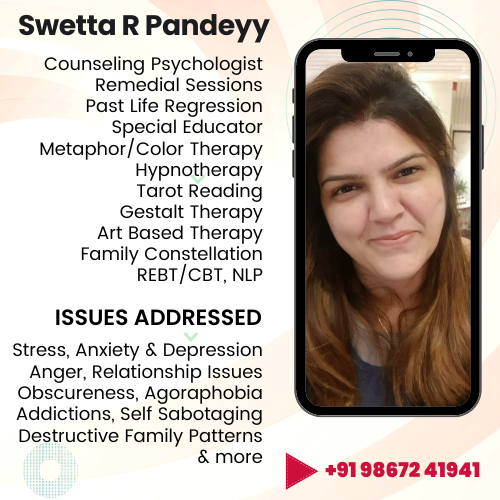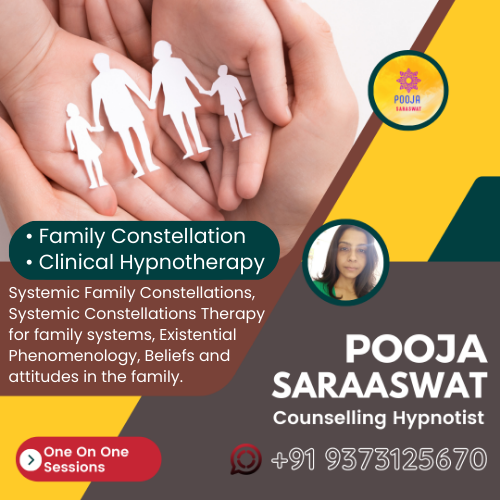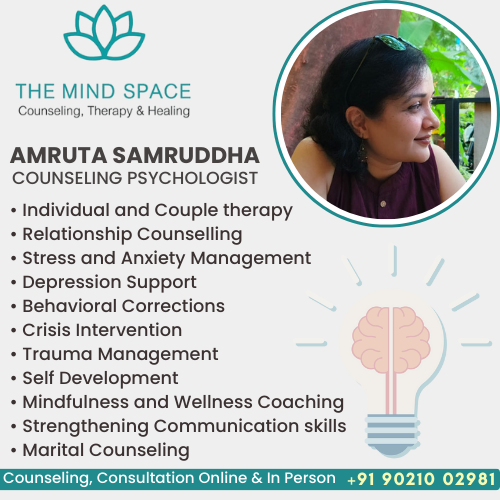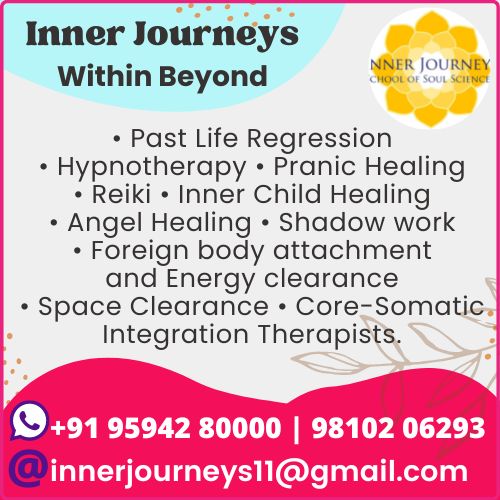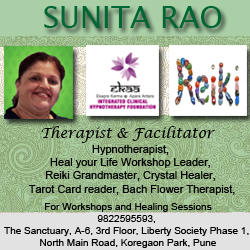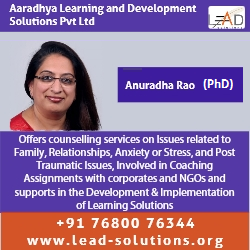Alternative Therapies
- Alternative Medicine
- Access Bars
- Access Body Processes
- Access Consciousness
- Access Energetic Faclift
- Acupressure
- Acupuncture
- Akashic Records
- Ancient Magnetism
- Angel Healing
- Aromatherapy
- Aura Reading
- Ayurveda
- Bach Flower Remedies
- Blueprint Numerology
- Breathwork
- Chakra Healing
- Cosmetic Acupuncture
- Crystal Healing
- Cupping Therapy
- Divine Healing Hands
- Distance Healing
- Emotional Freedom Technique (EFT)
- Energy Healing
- Energy Medicine
- Ergonomics
- Family Constellation
- Face Reading
- Fengshui
- Gaiadon Heart
- Geomancy
- Heal Your Life
- Graphology
- Holistic Solutions
- Holy Fire Reiki
- Homeopathy
- Ho'oponopono
- Humkara with Haleem
- Hypnotherapy
- Inner Child Therapy
- Intuitive Reading
- Jesus Reiki
- Jikiden Reiki
- Jin Shin Jyutsu
- Karuna Reiki
- Karmic Healing
- Lama Fera
- Lenormand Cards
- Light Language Healing
- Law of Attraction
- Manual Therapy
- Matrix Reimprinting
- Metaphor Therapy
- Meditation
- Mediumship
- Melchizedek Method
- Merlin Trinity Healing
- Merkaba Healing
- Mokshapat Reading
- Money Reiki
- Motivational Counseling
- Mudra Healing
- Nakshatra Energies
- Naturopathy
- Neuro Linguistic Programming (NLP)
- Numerology
- NumeroVastu
- Oracle Cards
- Panchakarma (Ayurveda)
- Past Life Regression
- Pendulum Dowsing
- Physiotherapy
- Pranic Healing
- Pranic Psychotherapy
- Pythagorean Numerology
- Quantum Touch Healing
- Pyramids
- Redikall Healing
- Reiki
- Rudraksh
- Runes
- Soul Plan Reading
- Sound Healing
- Star Magic Healing
- Space Clearing
- Sujok therapy
- Tarot
- Tera MaiTM Seichem
- Tea Leaf Reading
- Theta Healing
- Twin Flame Healing
- Twin Hearts Meditation
- Unani Medicine
- Yoga
- Wicca
- Womb Healing
Diseases & Conditions
- Acne & Pimples
- Allergies
- Arthritis
- Asthma
- Behavioural Disorders
- Cancer
- Dandruff
- Diabetes
- Emotional Problems
- Gallstones
- Gastritis
- Hairloss
- Heart Diseases
- Hormonal Problems
- Hypertension
- Immune Disorders
- Infections
- Infertility
- Jaundice
- Kidney Disorders
- Liver Disorders
- Menstrual Disorders
- Migraine
- Neck & Back Pain
- Obesity
- Osteoporosis
- Peptic Ulcer
- Prevention
- Prostate Problems
- Psoriasis
- Sexual Dysfunctions
- Sinusitis
- Sleep Disorders
- Skin Diseases
- Stress
- Thyroid Disorders
- Ulcerative Colitis
- Urinary Infections
General Wellness
Anger Management Counselling in Andheri

Ms. Anjali Nagpal
Anjali Nagpal is a business trainer, a life coach and workshop facilitator certified to present Heal Your Life transformational workshop worldwide (based on the philosophy of Louise L Hay) approved by Hay House, US. She also conducts others workshops relating to self healing.


Sweta R Pandey
Sweta Pandey is a counselling psychologist and regression therapist who focuses on addressing psychological, emotional, behavioural, and relational issues. She has experience treating psychological and mental issues in children, adults, and elderly people....


Ms. Pooja Saraaswat
Pooja's approach uses comprehensive and well-researched hypnotic techniques, health coaching, cognitive behavioral therapy, and counseling to bring into alignment many dimensions of families, family systems, existential phenomenology beliefs and attitudes in the family,

The Mind Matters - Ms. Amruta Samruddha

Amruta Samruddha is a passionate Counseling Psychologist with years of experience in practice in providing therapeutic Interventions and assessments to Individuals seeking personal growth and emotional well-being

Inner Journeys

A Certified Past Life Regression Therapist, Healer, psychic and channel, who has been working in the field of channelled spiritual direction since ...


Ms. Mukkta Jain
Mukkta Jain is a Life coach, Counsellor, Certified Hypnotherapist, Access Bars Practioner, Certified with Dr Brain Weiss in Past Life Regression, trained in Metaphor Therapy and Angel Card Reader. She is Proactive and dynamic spiritual healer.

Dr. Geetanjali Saxena.

Past life Regression Trainer, Family Constellation Trainer, Theta Healing Trainer, Inner Child Work, Angel Therapist, Reiki healer, Hypnotherapy, Crystal Healing, Graphology, Tarot card reader & Astrologer

The Sanctuary - Ms. Sunita Rao

In her pursuit of finding better ways to heal the human body, mind and spirit Sunita Rao has been certified by internationally renowned organizations such as the EKAA School of Integrated Clinical Hypnotherapy and Heal Your Life based on the philosophy of Louise L Hays. She is also a Reiki Grandmaster practising and initiating in the Usui system of Reiki..

Cosmicx Healing Art - Ms. KripaJyoti Nisha Singla

KripaJyoti Nisha Singla (PGDBM) is a Spiritual master, Energy worker, Reiki Master, Theta Instructor, and a dedicated Artist who has been working in the field of healings, spirituality, counselling, relationship healing, family therapy and alternative medicine therapies from more than 12 years.

Ms. Dishaa

As so rightly affirmed by Reiki Grandmaster Dishaa, a young and dynamic lady, an M.B.A turned natural healing expert from Chandigarh (India) for whom life has always been a 'Love for the Moment' which is beautiful yet compassionate...

Dr. Anuradha Rao

Dr Anuradha Rao comes with a total of 26 years of experience in the area of Human Resources. She has held several leadership positions in the corporate world with organizations like GE, IBM BTO Operations, and HR Head for Mphasis, Genpact and Deutsche Bank. She is the Founder & Principal Consultant of Aaradhya Learning and Development Solutions Pvt Ltd

ANGER MANAGEMANT

Anger Management
Anger doesn't typically exist by itself, particularly when it is intense or chronic. People with explosive tempers tend to do this and/or those who deal with their anger by physically acting out will also exhibit a number of other symptoms, including anxiety, unstable moods, a propensity for impulsive behavior, problems with drugs or alcohol, and an odd contradictory feeling towards those who are close to them. This feeling is characterized by a strong fear of being abandoned mixed with discomfort whenever they become overly emotionally involved with others.
Depression
Anger that's kept bottled up can affect your thoughts and feelings. You may begin to feel unhappy and lose interest in things you used to enjoy, such as hobbies, work, friends...
Stress
Stress related to work, family, health and money problems may make you feel anxious and irritable.
Frustration
You may get angry if you fail to reach a goal or feel as if things are out of your control.
Fear
Anger is a natural response to threats of violence, or to physical or verbal abuse.
Annoyance
You may react in anger to minor irritations and daily hassles.
Disappointment
Anger often results when expectations and desires aren’t met.
Resentment
You may feel angry when you’ve been hurt, rejected or offended.
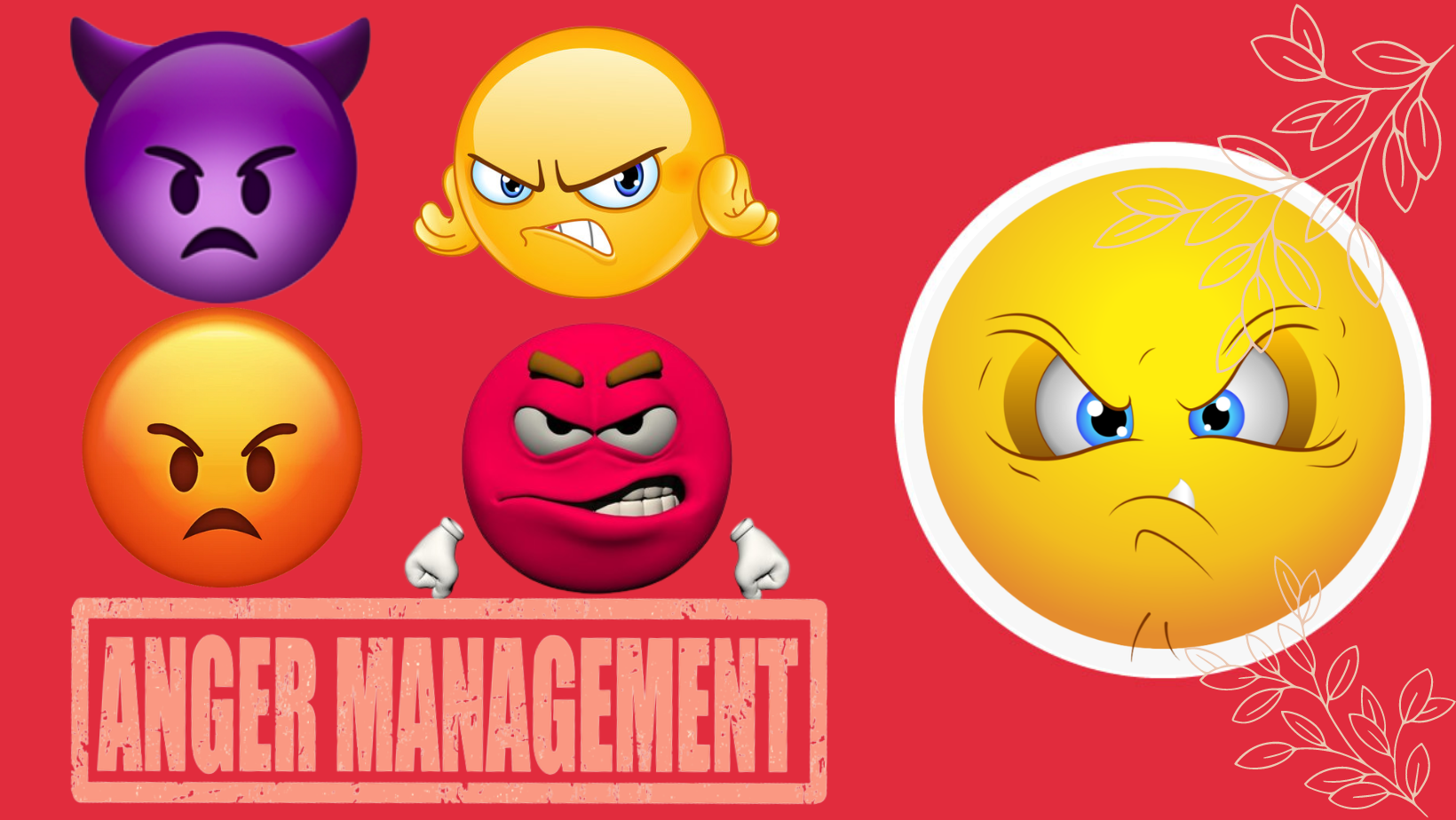
Anger can be contained, then transformed or directed. This occurs when you suppress your rage, put it out of your mind, and concentrate on the good. Your anger should be reduced or suppressed in order to channel it into more useful behaviour. The risk with this kind of reaction is that, if it isn't given a chance to be expressed openly, your anger may shift inward and on yourself. Anger that is directed inside can result in sadness or high blood pressure.


